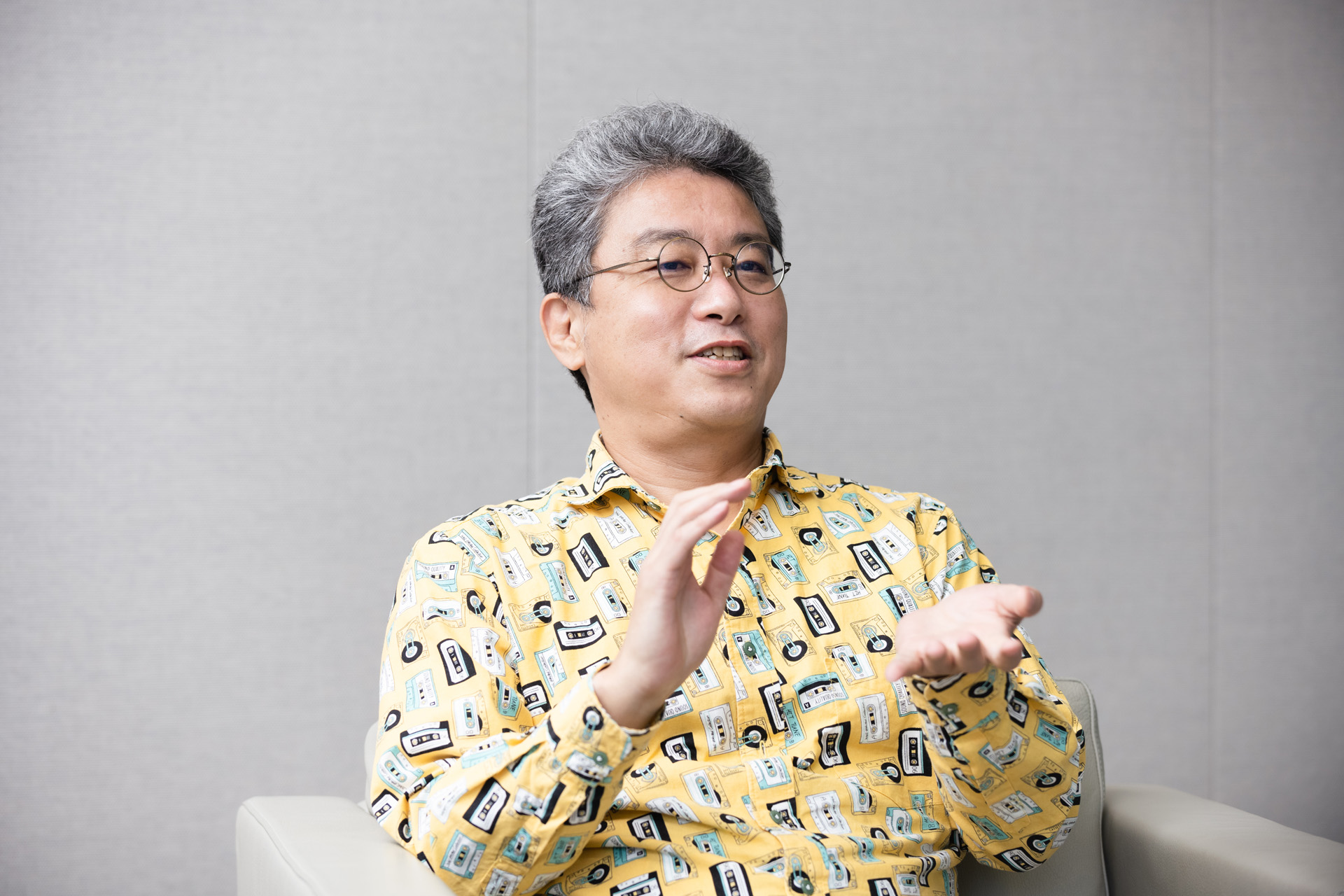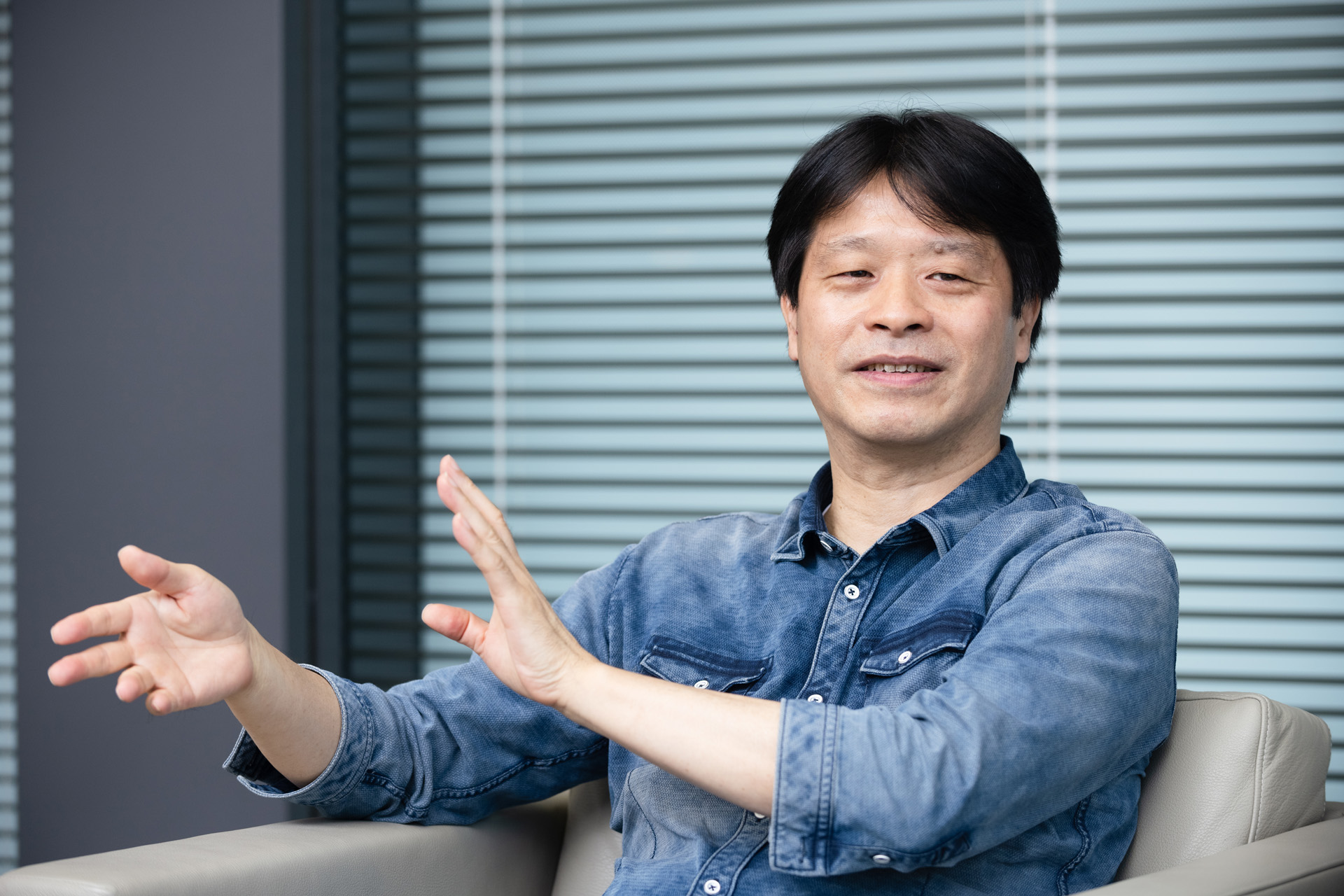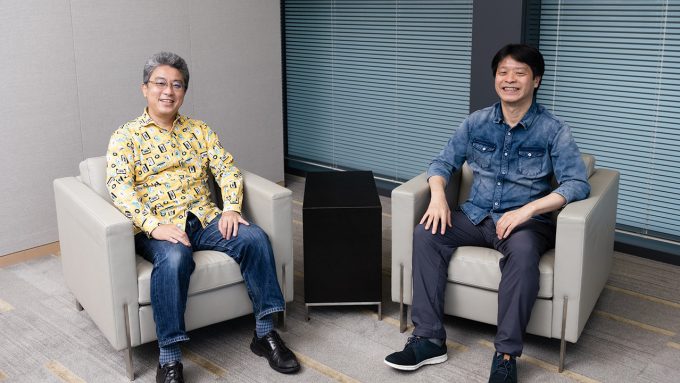“WE DISCUSS VANA’DIEL” is a series of conversations between Producer Matsui and special guests who are familiar with FINAL FANTASY XI (FFXI).
For our fifth guest, we invited Yoshinori Kitase, Brand Manager of the FINAL FANTASY (FF) series at Square Enix. In this third part, we spoke about the hardships of the development team as they handled the debugging themselves, as well as Mr. Kitase’s opinion on where FFXI excels.

Joined FF series development with FFV. He directed the title from FFVI through FFVIII and began working as a producer with FFX. Since then, he has worked on numerous titles and works related to the FF series. His latest work, FFVII Remake, released in 2020. As of April 2021, he succeeded Shinji Hashimoto as the Brand Manager of the FF series.
Combatting bugs with all hands on deck
When FFXI launched in 2002, high levels of congestion prevented many players from logging in on the first day. Mr. Kitase, you were probably working on FFX-2 around then, but what were your thoughts on the turmoil?
- Kitase
That would’ve been almost 20 years ago... Was it a major incident?
At the time, a public apology was published in the newspaper.
- Kitase
Oh, I vaguely remember that.
What was it like for you and your team, Mr. Matsui? - Matsui
There was nothing I could personally do about it, and those of us in the development team were told to concentrate on development tasks. Aside from the actual Support team, everyone involved with FFXI was called in to address the issue, and it was utter chaos.
- Kitase
It’s a common story you hear about online services nowadays, but I’m sure it was incredibly worrisome at the time.
There weren’t many MMORPGs in Japan yet, so it must’ve been hard to guess what to prepare for launch.
- Matsui
That being said, we only sold physical copies of FFXI, which meant there was no way we’d have more users than the number of copies shipped.
Because of that, it should’ve been possible to estimate to some degree based on the number of sales, not to mention we’d only shipped as many as we thought we could handle to begin with. In fact, we only experienced congestion with logging in, and the game itself was fine. Perhaps it would’ve been a good idea to grant early access for pre-orders, or to have taken some other measure to spread out the traffic at launch a little bit more. - Kitase
As for the development team, how many users were you expecting?
- Matsui
We launched with 20 Worlds that could each handle up to 5,000 simultaneous connections, and we were guessing something like 3,000 simultaneous connections per World.
- Kitase
What was that estimate based on?
- Matsui
It was probably a generous estimate based on our number of sales and the number of PlayStation BB Units (a hard disk drive for the PlayStation 2) that were produced. We had a positive response during the beta test, after all.
- Kitase
Oh right, there was the beta test.
- Matsui
If you played even once during the beta test, you were able to choose your character’s World by adjusting how much gil they had, so there was probably data from that too.
* Beta test participants were able to choose their character’s World based on the last two digits of the amount of gil they possessed.
I don’t know the details since I wasn’t involved with operations at the time, but I heard that the server programmers made their calculations based on the processing speeds and network load for each hosting server machine at the time. - Kitase
I think it was the first beta test our company ever did, right? I also remember owning the beta test kit myself.
FFXI certainly set all sorts of precedents.
- Matsui
We'd made playable demos before, but as you said, that was our first beta test.
But going back to the earlier topic, I guess the turmoil of launch day was just “Oh right, there was something like that,” for someone on another team like Mr. Kitase. I thought it would've been a major issue across the entire company.
- Kitase
Well, it’s partly because I forgot most of it, since it was so long ago. (laughs)
- Matsui
Looking back, our mindset was still based on single-player games, and some of our reactions like, “Do we need to do a recall!?” may have been exaggerated. But even then, the FFXI team never begged the other teams for help.
- Kitase
In terms of issues requiring multiple teams, there was that time when a bug was discovered in one of our games right before the final deadline.
Members from other teams were called in to help debug, and there were three different shifts. I remember showing up to work around 6:00 in the evening and debugging until morning. - Matsui
After that incident, we started putting more emphasis on having QA staff members*, didn’t we?
* Quality Assurance teams, often referred to as “QA,” are staff members who check games to locate and report any flaws. - Kitase
That’s right.
I think that incident increased our awareness that debugging should be handled by a dedicated team. As games have grown larger and more complex over the years, checking them requires a considerable amount of time, and there are so many aspects that potentially have bugs.
- Matsui
When the debugging process is handled over an extended period of time, it can get harder for experienced testers to locate certain types of bugs. Because of that, we started asking for people unfamiliar with games or new members to test our games right before they’re finished.
I can imagine how a lot of issues might be overlooked when you’re familiar with games.
- Matsui
As such, we now have newcomers and veterans check for different things.
- Kitase
By the way, how was debugging handled for FFIV?
* Seiken Densetsu: Final Fantasy Gaiden was released as Final Fantasy Adventure in North America and as Mystic Quest in Europe.
For Seiken Densetsu*, we had a team of students working on the debugging part-time. - Matsui
FFIV also only had a few nonmembers handle the debugging, and the rest was handled by employees.
- Kitase
I thought so.
Back then, it was typical for development teams to do the debugging themselves. Nowadays it’s handled by huge teams over extended periods of time, and I get nostalgic thinking back to when debugging was handled by about four people. (laughs) - Matsui
Yes, it took about a month or two with four people. We also reserved a space for testers right next to the FFXI development booth. Mr. Tanaka (Hiromichi Tanaka, original producer of FFXI) used to tell us, “Every now and then, the Battle team should take a peek at how the testers play the battles.”
We referred to them as “in-department testers,” and there were plenty of others who checked the other aspects of the game. I’d say they had around the same number of staff as our development team, or perhaps even outnumbered us. - Kitase
We certainly have a lot of in-department testers nowadays, but I think the FFXI team started that trend.
- Matsui
That might be true.
As a matter of fact, some in-department testers were recruited and became full-time employees. There certainly seem to be some people who have a knack for locating bugs.
- Matsui
That kind of talent is definitely important, but in our case, things like knowledge and passion for FFXI, or their personality and attitude towards work, are usually weighed more heavily.
On the topic of bugs, FFXI allowed for fixing issues with version updates, which I imagine was a new way of development. Did that affect your mindset in any way?
- Matsui
A fatal error could break a game, so there was never a case where we were like, “It’s okay to ship this, even if it has bugs.” On the contrary, being able to make changes afterward gave me more reason to make balance adjustments.
Was that because you could listen to player feedback then make changes as necessary?
- Matsui
At first, I went around tweaking the numbers whenever there was some sort of issue. But then at one point, someone mentioned, “These constant adjustments are hindering us from establishing strategies,” and that really stuck with me.
I’d always claimed, “I want to make a game that values strategizing,” but in fact, my adjustments were squashing players’ strategies. Adjustments like version updates and expansion packs are fine, since they expand upon what players can do. But since then, I’ve learned that nerfing things solely based on my intentions should be avoided whenever possible.

Fidgeting with the numbers might bring the game closer to your ideal balance. But there’s the matter of whether it’s worth putting the players through that, not to mention there’s always backlash against nerfs.
- Matsui
It’s a different story, however, when a particular job is at a clear disadvantage.
For instance, if a certain ability is too powerful and causes certain jobs to be excluded from certain content, that would call for an adjustment to be made. Other than cases like that, I try to keep changes to a minimum when making balance adjustments. - Kitase
By the way, version updates seem like they were part of the original plan, but were expansion packs always a part of it too?
- Matsui
Rise of the Zilart was part of the initial plan.
Expansions from Chains of Promathia onward were proposed based on the game’s success. - Kitase
With offline titles back then, we were given a month off when the title was released, and it was like a period for us to refresh and relax before working on the next one.
But did the FFXI team have any time off after the first mastering? - Matsui
No, and we weren’t able to take a break for quite some time.
At some point, there was a version update that added a lot of notorious monsters (NMs), and I was given a week off while that was being made. On that occasion, I took my laptop home and brainstormed ideas for NMs. - Kitase
That sounds more like work to me. (laughs wryly)
- Matsui
It was valuable time where I didn’t have to handle bugs and other tasks, so I wanted to brainstorm ideas for NMs.
After I returned from my vacation, I told the staff members, “These are the NMs I’ll be adding, so please prepare some reward items,” and that was my first long-term vacation after I joined the FFXI team. - Kitase
From the outside looking in, I always wondered if you ever took breaks.
- Matsui
Didn’t you experience something similar yourself, when you later became the producer of Mobius Final Fantasy?
- Kitase
Yes, to some extent.
Being in charge of a smartphone service title, I thought, “Man, service titles can’t take a break after all, that’s rough.” I finally realized that after more than a decade after FFXI was released. - Matsui
Although it was certainly rough, there are certain aspects where I look back and realize I could’ve made things easier for myself.
But perhaps your perseverance through those times is what laid the foundation for the FFXI we have today.
- Matsui
On the WE ARE VANA’DIEL website, we have a historical timeline called WE REMEMBER VANA’DIEL.
When I saw the great number of events that took place just in 2002 alone, it made me reflect on how that one year allowed us to keep going for 20 years thereafter.
The charm of FFXI comes from 20 years of memories
Mr. Kitase, what’s something that stands out to you about FFXI?
- Kitase
This isn’t about FFXI itself, but as I meet with various famous and important figures in my line of work, occasionally I’ll run into a hardcore fan of FFXI.
These people at the forefront of various industries share a commonality in FFXI, and it makes me a little envious.

So you mean these high-ranking people come up to you and say, “You know, I used to play FFXI.”
- Kitase
The game’s been around for 20 years, and its influence has spread far and wide during that time. The way it’s sowed countless seeds and expanded its reach sets it apart from single-player FF titles.
- Matsui
You say that, but aren't FFVII and FFX really popular even today?
- Kitase
Of course, I do get approached by people from the generation that grew up with and adore FFVII and FFX, but since FFXI has continued on for 20 years, I think its player base is just on a different level.
- Matsui
Do you mean in terms of how consistently they play the game?
- Kitase
For FFVII, I’d say it takes somewhere around 50 to 70 hours to complete the game.
Many of the people who played it enjoyed their experience, and I’m sure some of them have even played through it multiple times. But when you look at the people who have been playing FFXI the longest, they’ve been immersed in the world of Vana’diel for almost 20 years, and I imagine their feelings for the game are on yet another level. There was that time Koichi Miyamoto of KinKi Kids spoke about FFXI on the radio.
- Kitase
It’s certainly wonderful when a celebrity talks about FFXI. It feels as if the game has even influenced the entertainment industry.
Although FFVII also has hardcore fans throughout the world, FFXI has a different kind of passion to it.
- Matsui
I’d never thought of it that way. It makes me happy to hear that.
There’s also many couples who met through FFXI and ended up getting married.
- Kitase
It’s a lot like life.
Single-player FF titles are like precious memories from your childhood, whereas with FFXI, it’s more like an experience you lived through. As for you, Mr. Matsui, is there anything from Mr. Kitase’s work that left an impression with you?
- Matsui
I’m getting old, so the things that left an impression with me are all from the past. (laughs)
Starting with the first time we worked together in FFV, I remember thinking how reliable he was. Schedule delays are common in game development, but I felt that the parts Mr. Kitase worked on were always proceeding on time.
As for FFVI, we didn’t work together, but when I was debugging the game, it was filled with so many surprising ideas that made me go, “Wow, I didn’t know you could something like this in a game!” The fantasy genre tends to stick to a pattern, which is the case with FFXI as well. I believe you’re referring to Western fantasy, or “high fantasy.”
- Matsui
I didn’t have the courage to step outside of that.
In my opinion, FFVI was the turning point in our numbered titles, and the way it expanded everyone’s definition of “fantasy” allowed for FFVII and FFVIII. I certainly see what you mean, what with steampunk and opera elements.
- Matsui
The opera theme was absolutely wonderful.
- Kitase
The fact that Mr. Sakaguchi (Hironobu Sakaguchi, founder of the FF series) approved of it played a big part too.
- Matsui
I’m sure FFVI itself was established through various people’s ideas, but when you view it as a standalone game, there’s so many “Kitase elements” and I think it’s a truly amazing title. I personally wanted to see your handiwork on other titles, so I feel it’s a bit of a shame that you gradually moved to the management side of things.
- Kitase
What about you, Mr. Matsui?
Do you still do development tasks in addition to working as a producer? - Matsui
I’m still writing code, as always.
- Kitase
That’s quite incredible.
Mr. Kitase, you were a director up until FFVIII and switched over to a producer role in FFX. Would that mean FFVIII is the last title you worked on as part of the development team?
- Kitase
Actually, FFVII would be the last title that you could say I worked on with my own hands. I did work on FFVIII to some extent, but we had more staff members by then, and they were able to handle most of the work.
Sounds like you already started taking on a more producer-like role in FFVIII.
- Kitase
The difference between producers and members of the development team is more like a gradient, and as someone who went through the development workplace first, there isn’t a distinct role for the producer.
That being said, there certainly are producers who focus solely on their producer role. - Matsui
Former Square members have more of a “head of the development team” kind of presence even after they become a producer, don’t they?
- Kitase
When you think about it, Mr. Kawazu (Akitoshi Kawazu, founder of the SaGa series) is still actively working past his prime. (laughs)
He’s the role model we should strive for.




